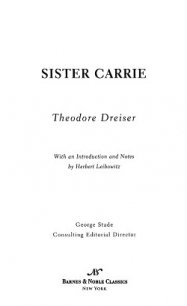Jennie Gerhardt - Драйзер Теодор (книги без регистрации бесплатно полностью сокращений .txt) 📗
thousand, and try a practical investment of some kind—say a rival
carriage company. But did he want to jump in, at this stage of the game,
and begin a running fight on his father's old organisation? Moreover, it
would be a hard row to hoe. There was the keenest rivalry for business as it was, with the Kane Company very much in the lead. Lester's only
available capital was his seventy-five thousand dollars. Did he want to
begin in a picayune, obscure way? It took money to get a foothold in the
carriage business as things were now.
The trouble with Lester was that, while blessed with a fine imagination
and considerable insight, he lacked the ruthless, narrow-minded
insistence on his individual superiority which is a necessary element in
almost every great business success. To be a forceful figure in the
business world means, as a rule, that you must be an individual of one
idea, and that idea the God-given one that life has destined you for a
tremendous future in the particular field you have chosen. It means that
one thing, a cake of soap, a new can-opener, a safety razor, or speed-
accelerator, must seize on your imagination with tremendous force, burn
as a raging flame, and make itself the be-all and end-all of your existence.
As a rule, a man needs poverty to help him to this enthusiasm, and youth.
The thing he has discovered, and with which he is going to busy himself,
must be the door to a thousand opportunities and a thousand joys.
Happiness must be beyond or the fire will not burn as brightly as it might
—the urge will not be great enough to make a great success.
Lester did not possess this indispensable quality of enthusiasm. Life had already shown him the greater part of its so-called joys. He saw through
the illusions that are so often and so noisily labelled pleasure. Money, of course, was essential, and he had already had money—enough to keep
him comfortably. Did he want to risk it? He looked about him
thoughtfully. Perhaps he did. Certainly he could not comfortably
contemplate the thought of sitting by and watching other people work for
the rest of his days.
In the end he decided that he would bestir himself and look into things.
He was, as he said to himself, in no hurry; he was not going to make a
mistake. He would first give the trade, the people who were identified
with the manufacture and sale of carriages, time to realise that he was out of the Kane Company, for the time being, anyhow, and open to other
connections. So he announced that he was leaving the Kane Company
and going to Europe, ostensibly for a rest. He had never been abroad, and Jennie, too, would enjoy it. Vesta could be left at home with Gerhardt and a maid, and he and Jennie would travel around a bit, seeing what Europe
had to show. He wanted to visit Venice and Baden-Baden, and the great
watering- places that had been recommended to him. Cairo and Luxor
and the Parthenon had always appealed to his imagination. After he had
had his outing he could come back and seriously gather up the threads of
his intentions.
The spring after his father died, he put his plan into execution. He had
wound up the work of the warerooms and with a pleasant deliberation had
studied out a tour. He made Jennie his confidante, and now, having
gathered together their travelling comforts they took a steamer from New
York to Liverpool. After a few weeks in the British Isles they went to
Egypt. From there they came back, through Greece and Italy, into Austria
and Switzerland, and then later, through France and Paris, to Germany
and Berlin. Lester was diverted by the novelty of the experience and yet
he had an uncomfortable feeling that he was wasting his time. Great
business enterprises were not built by travellers, and he was not looking for health.
Jennie on the other hand, was transported by what she saw, and enjoyed
the new life to the full. Before Luxor and Karnak—places which Jennie
had never dreamed existed—she learned of an older civilisation,
powerful, complex, complete. Millions of people had lived and died here,
believing in other gods, other forms of government, other conditions of
existence. For the first time in her life Jennie gained a clear idea of how vast the world is. Now from this point of view—of decayed Greece, of
fallen Rome, of forgotten Egypt, she saw how pointless are our minor
difficulties, our minor beliefs. Her father's Lutheranism—it did not seem so significant any more; and the social economy of Columbus, Ohio—
rather pointless, perhaps. Her mother had worried so of what people—her
neighbours—thought, but here were dead worlds of people, some bad,
some good. Lester explained that their differences in standards of morals were due sometimes to climate, sometimes to religious beliefs, and
sometimes to the rise of peculiar personalities like Mohammed. Lester
liked to point out how small conventions bulked in this, the larger world, and vaguely she began to see. Admitting that she had been bad—locally it
was important, perhaps, but in the sum of civilisation, in the sum of big forces, what did it all amount to? They would be dead after a little while, she and Lester and all these people. Did anything matter except goodness
—goodness of heart? What else was there that was real?
CHAPTER XLV
It was while travelling abroad that Lester came across, first at the Carlton in London and later at Shepheards in Cairo, the one girl, before Jennie,
whom it might have been said he truly admired— Letty Pace. He had not
seen her for a long time, and she had been Mrs. Malcolm Gerald for
nearly four years, and a charming widow for nearly two years more.
Malcolm Gerald had been a wealthy man, having amassed a fortune in
banking and stock-brokering in Cincinnati, and he had left Mrs. Malcolm
Gerald very well off. She was the mother of one child, a little girl, who was safely in charge of a nurse and maid at all times, and she was
invariably the picturesque centre of a group of admirers recruited from
every capital of the civilised world. Letty Gerald was a talented woman,
beautiful, graceful, artistic, a writer of verse, an omnivorous reader, a student of art, and a sincere and ardent admirer of Lester Kane.
In her day she had truly loved him, for she had been a wise observer of
men and affairs, and Lester had always appealed to her as a real man. He
was so sane, she thought, so calm. He was always intolerant of sham, and
she liked him for it. He was inclined to wave aside the petty little
frivolities of common society conversation, and to talk of simple and
homely things. Many and many a time, in years past, they had deserted a
dance to sit out on a balcony somewhere, and talk while Lester smoked.
He had argued philosophy with her, discussed books, described political
and social conditions in other cities—in a word, he had treated her like a sensible human being, and she had hoped and hoped and hoped that he
would propose to her. More than once she had looked at his big, solid
head with its short growth of hardy brown hair, and wished that she could stroke it. It was a hard blow to her when he finally moved away to
Chicago; at that time she knew nothing of Jennie, but she felt
instinctively that her chance of winning him was gone.
Then Malcolm Gerald, always an ardent admirer, proposed for something
like the sixty-fifth time, and she took him. She did not love him, but she was getting along, and she had to marry some one. He was forty-four




